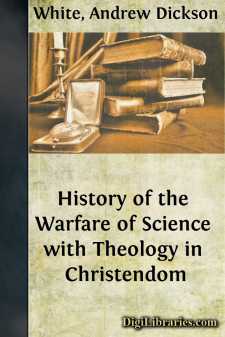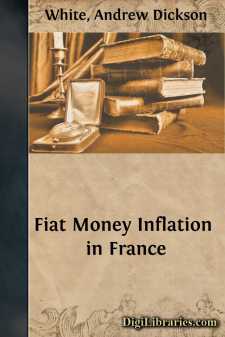Categories
- Antiques & Collectibles 13
- Architecture 36
- Art 48
- Bibles 22
- Biography & Autobiography 813
- Body, Mind & Spirit 142
- Business & Economics 28
- Children's Books 17
- Children's Fiction 14
- Computers 4
- Cooking 94
- Crafts & Hobbies 4
- Drama 346
- Education 46
- Family & Relationships 57
- Fiction 11829
- Games 19
- Gardening 17
- Health & Fitness 34
- History 1377
- House & Home 1
- Humor 147
- Juvenile Fiction 1873
- Juvenile Nonfiction 202
- Language Arts & Disciplines 88
- Law 16
- Literary Collections 686
- Literary Criticism 179
- Mathematics 13
- Medical 41
- Music 40
- Nature 179
- Non-Classifiable 1768
- Performing Arts 7
- Periodicals 1453
- Philosophy 64
- Photography 2
- Poetry 896
- Political Science 203
- Psychology 42
- Reference 154
- Religion 513
- Science 126
- Self-Help 84
- Social Science 81
- Sports & Recreation 34
- Study Aids 3
- Technology & Engineering 59
- Transportation 23
- Travel 463
- True Crime 29
History of the Warfare of Science with Theology in Christendom
Description:
Excerpt
My book is ready for the printer, and as I begin this preface my eye lights upon the crowd of Russian peasants at work on the Neva under my windows. With pick and shovel they are letting the rays of the April sun into the great ice barrier which binds together the modern quays and the old granite fortress where lie the bones of the Romanoff Czars.
This barrier is already weakened; it is widely decayed, in many places thin, and everywhere treacherous; but it is, as a whole, so broad, so crystallized about old boulders, so imbedded in shallows, so wedged into crannies on either shore, that it is a great danger. The waters from thousands of swollen streamlets above are pressing behind it; wreckage and refuse are piling up against it; every one knows that it must yield. But there is danger that it may resist the pressure too long and break suddenly, wrenching even the granite quays from their foundations, bringing desolation to a vast population, and leaving, after the subsidence of the flood, a widespread residue of slime, a fertile breeding-bed for the germs of disease.
But the patient mujiks are doing the right thing. The barrier, exposed more and more to the warmth of spring by the scores of channels they are making, will break away gradually, and the river will flow on beneficent and beautiful.
My work in this book is like that of the Russian mujik on the Neva. I simply try to aid in letting the light of historical truth into that decaying mass of outworn thought which attaches the modern world to mediaeval conceptions of Christianity, and which still lingers among us—a most serious barrier to religion and morals, and a menace to the whole normal evolution of society.
For behind this barrier also the flood is rapidly rising—the flood of increased knowledge and new thought; and this barrier also, though honeycombed and in many places thin, creates a danger—danger of a sudden breaking away, distressing and calamitous, sweeping before it not only out worn creeds and noxious dogmas, but cherished principles and ideals, and even wrenching out most precious religious and moral foundations of the whole social and political fabric.
My hope is to aid—even if it be but a little—in the gradual and healthful dissolving away of this mass of unreason, that the stream of "religion pure and undefiled" may flow on broad and clear, a blessing to humanity.
And now a few words regarding the evolution of this book.
It is something over a quarter of a century since I labored with Ezra Cornell in founding the university which bears his honored name.
Our purpose was to establish in the State of New York an institution for advanced instruction and research, in which science, pure and applied, should have an equal place with literature; in which the study of literature, ancient and modern, should be emancipated as much as possible from pedantry; and which should be free from various useless trammels and vicious methods which at that period hampered many, if not most, of the American universities and colleges.
We had especially determined that the institution should be under the control of no political party and of no single religious sect, and with Mr. Cornell's approval I embodied stringent provisions to this effect in the charter.
It had certainly never entered into the mind of either of us that in all this we were doing anything irreligious or unchristian....



